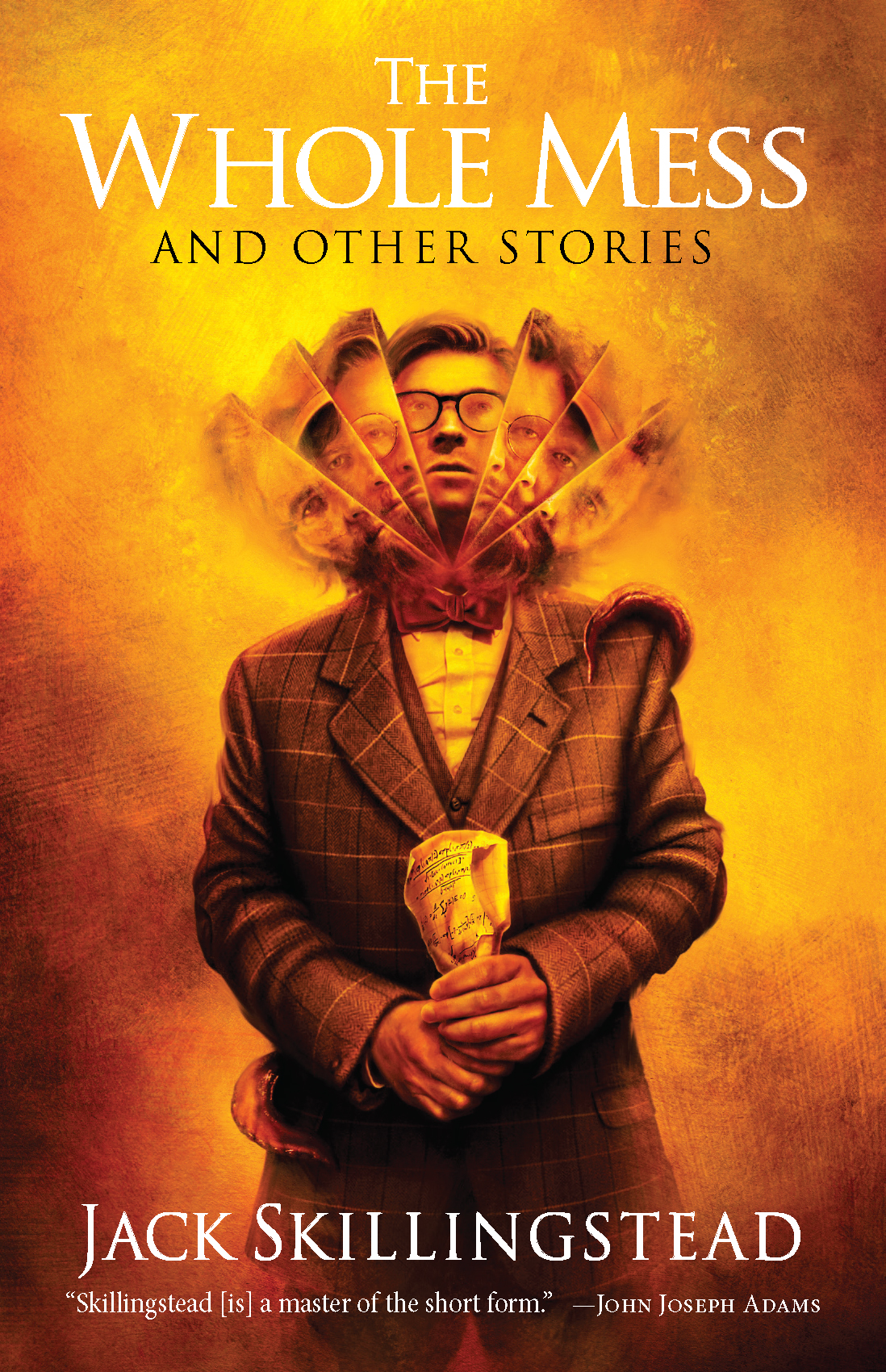
Jack Skillingstead is joining us today to talk about his novel, The Whole Mess & Other Stories. Here’s the publisher’s description:
What does it mean to be human in a universe of shifting, sometimes terrifying realities? Eighteen stories from Jack Skillingstead’s second decade of publishing feature intense and surprising explorations of who we are, who we wish to be, and who we can’t be.
In “The Whole Mess” a genius math professor solves a multiverse equation only to find himself pursued by ancient Masters across the many iterations of his could-have-been lives. “Straconia” gives us a Kafkaesque world where all the lost things go, including people who must first find themselves before they can find a way back home. “Tribute” looks at a post-NASA space race that goes nowhere until an unlikely pair of marooned astronauts find each other and the future.
Also included in this collection is “The Writing Life,” a self-reflection on memory, ambition, and imagination in the formation of one writer’s journey.
What’s Jack’s favorite bit?

Jack Skillingstead
The Whole Mess is my second collection of short fiction. The first came out in 2009, so it seemed like a good time to see if I had enough published work to warrant a second. It turned out I had a little more than needed, so I pitched the book to Patrick Swenson at Fairwood Press and went to work organizing and editing the stories. I wanted to add something previously unpublished and decided it could be interesting to write an essay about the somewhat-longer-than-usual road to my first pro sale. My thought was that young writers still in the wilderness might take some solace in my journey. Also, I wanted to honestly own up to my past. What I discovered was that the past is constructed from a fluid combination of memory and imagination—personal history is a story, too. I love the fiction in this collection, but I’m especially fond of the essay. The following paragraphs—with strategic edits—are from the “The Writing Life.” The essay itself is nearly seven thousand words long.
The first draft of “The Writing Life” acknowledged that, yes, I’d written a lot of words over a long period of time prior to breaking into print, but, I’d told myself, the reason it took so long was a combination of my disorganization and my dread of rejection—that dread exacerbated by emotional trauma suffered in adolescence. That had been the story I told people for years after I finally started publishing, and I genuinely believed it.
But something about that first version of the essay didn’t add up. It felt like I was writing about someone else, maybe one of the characters from, as my wife likes to put it, my “tortured lonely guy” stories. I decided to excavate my old manuscripts, notebooks, and rejections out the storage closet. I was looking to reconstruct a timeline to see where my memory may have gone off track. Luckily I’d had the foresight to put dates on the novels, and many of the rejection letters and correspondence with editors and agents were also date-marked. But I soon discovered that I was doing more than establishing a timeline; I was discovering the true picture of who I had been, and the person who emerged wasn’t the guy I’d been selling to myself and others. This was surprising, to say the least.
My wife came into the kitchen that first day of excavation and found me sorting through piles and piles of rejection letters. “What are you doing?” she asked. I told her I was trying to find the guy I used to be, so I could understand how I became who I am. Or something. She laughed. It is kind of funny, when you think about it. For the next week or so, it was our little joke. I would be shut up in my office, floor and desk covered with old manuscripts, bent over notebooks I’d filled with my illegible scrawl decades ago. “How’s it going?” she’d call from down the hall. “Find him yet?”
Eventually I did find him, and that’s why “The Writing Life” is my Favorite Bit.
LINKS:
The Whole Mess universal book link
BIO:
Jack Skillingstead has sold more than forty stories to markets including Asimov’s, Clarkesworld, F&SF, and Lightspeed, as well as various Year’s Best volumes and original anthologies. He has been a finalist for both the Sturgeon Award for short fiction and the Philip K. Dick Award for best novel. He lives in Seattle with his wife, writer Nancy Kress and a stubborn (but lovable) Chihuahua named Pippin.
